RESEARCH DESIGN AND METHODS
Rationale
Context of the research
The research is going to be conducted in the context of quality management practices on customer satisfaction and retention. Customers are the external shareholders of the organizations and companies focus on customer satisfaction to maintain an effective brand image. According to Saffar and Obeidat (2020), organizations utilize quality management practices to improve their product and services which leads to customer satisfaction. Organizations need to analyse the expectations and requirements of their customers to provide appropriate products and services. According to Al-Omari Alomari and Aljawarneh (2020), quality management practices allow businesses to focus on customer satisfaction by analysing industry trends and the demands of the customers. Quality management addresses the purchasing behaviour of the consumers and utilizes customer behaviour to enhance the quality of products and services. Organizations need to build a strong relationship with their customers to gain their trust and identify their needs.
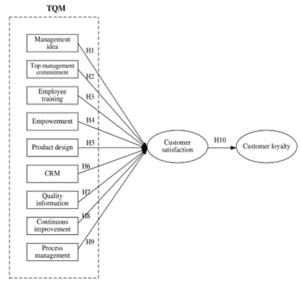
Figure 1: Total quality management
(Source: Saffar and Obeidat, 2020)
Challenges of implementing quality management practices
Organizations focus on improving their products and services by considering the needs of their customers and it leads to customer satisfaction. However quality management practices are required to achieve customer satisfaction and retention. According to Shahid Iqbal, Ul Hassan, and Habibah (2018), the organization often faces challenges in implementing quality management practices because of the strategies and operations of the business. Quality management roaches may not be suitable for certain business strategies and operations and it is a major challenge for organizations. Businesses often feel demotivated because their competitors have a certified quality management system which gives them a comparative edge. According to Pambreni, Khatibi, Azam, and Tham (2019), Quality management practices require a lot of collaborative effort and businesses often fail to maintain their collaborative efforts. organizations often use a rigid management system that restricts them from making necessary changes.
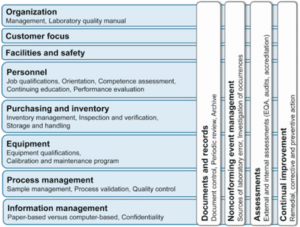
Figure 2: Challenges of implementing quality management practices
(Source: Hassan and Habibah, 2018)
Theoretical literature
Theories related to quality management practices need to be evaluated to identify their role in customer satisfaction and retention. According to Mahmoud, Hinson, and Anim (2018), theories such as Deming’s theory, Crosby’s theory are used by organizations to understand the importance of quality management. Deming’s theory of quality management states that if organizations focus on costs the quality may deteriorate while the cost rises. This theory is useful to understand the importance of quality management inside an organization. Crosby’s theory states the money spent on quality management is an investment that leads to customer satisfaction.
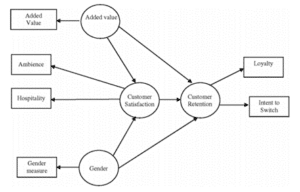
Figure 3: Customer satisfaction and retention
(Source: Mahmoud, Hinson and Anim, 2018)
Significance of the research
The role of quality management practices on customer retention and satisfaction is analysed in this research. Organizations are experiencing an increase in customer demands and it is high time to analyse quality management practices. This research can help to understand how organizations can maintain customer satisfaction through quality management practices. This study can provide key insight on customer satisfaction and how it can lead to customer retention.
Scope of the research
This research is crucial to identify the key aspects of quality management and how it can be improved. This study can be beneficial to explore the effect of customer satisfaction retention on organizational performance. The study can provide key insights on the challenges the organizations are facing to adopt quality management practices.
Research focus
Research aim
The research study aims to identify the role of quality management practices on customer satisfaction and retention.
Research questions
The research questions are as follows:
Q1. What is the role of quality management on customer satisfaction and retention?
Q2. What are the ways the organization can follow to improve quality management practices?
The key tasks are finding out role of management in consumer satisfaction and how it can improve.
Research hypothesis
The research hypothesis of the study are as follows
H1: Quality management practices have a significant impact on customer satisfaction and retention.
H0: There is no impact of quality management practices on customer satisfaction and retention.
Research design
Research design, Philosophy (ontology) and strategy (epistemology)
Research design is a set of methods and techniques chosen by the researcher to conduct reliable and effective research. According to Flynn, Pagell, and Fugate (2018), research design can be categorized into five elements as Descriptive, Experimental, Correlational, Diagnostic, and Explanatory research design. Descriptive research design can be used to collect, analyse and present research data. This research design helps the research professionals to address the research topic or situation effectively. The descriptive research design will be selected for this research because it provides a structured data collection and analysis process. This design can help to explain the need for this research and identify how the research can be conducted effectively.
Research philosophy helps to provide a brief overview of the ways in which particular research needs to be collected. According to Kennedy (2017), research philosophy can be categorized into four types such as pragmatism, positivism, realism, and interpretivism. Positivism is a highly structured philosophy that utilizes a large set of data samples. Positivism philosophy will be selected for this research because it helps to focus on factual knowledge through a large set of information. Key aspects of quality management practices can be identified using the research philosophy.
Research strategy can be described as an action plan which helps to provide direction to the thoughts and ideas. According to Rong et al. (2020), research strategy is crucial to systematically schedule the research process which leads to reliable research outcomes. A qualitative research strategy will be selected to conduct this research because this strategy can help to conduct reliable research based on pre-existing research data.
Methodological approach
A research approach can be referred to as a set of plans and procedures which include the steps of assumptions to data collection and analysis. According to Martins et al. (2019), based on the data analysis approaches research approach can be divided into three parts as Inductive, Deductive, and Abductive research approaches. The deductive research approach helps to construct research hypotheses based on pre-existing theories. According to Pallottino et al. (2018), research professionals are able to test their hypothesis through data analysis and draw reliable conclusions using deductive approaches. Inductive research approaches do not address hypotheses, it focus on the aim and objectives that need to be achieved throughout the research.
The Abductive research approach focuses on explaining incomplete observations utilizing qualitative or quantitative data collection methods. A deductive research approach will be chosen for this research because it allows the establishment of reliable and effective assumptions based on pre-existing theories. The role of quality management practices on customer satisfaction can be analysed by establishing appropriate assumptions based on the existing theories. This approach is useful to test assumptions and this approach can help to test the research hypothesis by comparing it with collected data.
Data collection and analysis methods
Data collection methods can be categorized into two parts such as primary data collection and secondary data collection. According to Fiesler, Beard, and Keegan (2020), Primary data collection includes collecting data through surveys, interviews, and observations. Secondary data collection will be conducted through a thematic analysis approach. According to Brown (2018), thematic analysis is a secondary data collection process that utilizes pre-existing research journals to identify new themes and patterns. Data analysis is a technique that is used to evaluate and summarize collected data. Data analysis can be categorized into two types such as qualitative and quantitative data analysis. Data analysis has a crucial role in research study and it allows research professionals to make effective research decisions.
Brief indication of key tasks
Research journals and books related to quality management will be collected from reliable sources to conduct the research and this process will take roughly one week. The collected resources will be verified to ensure the reliability and effectiveness of the research and this total process will take approximately two weeks.
Ethical issues
Ethical issues need to be considered to conduct an effective and transparent research study. This research will be conducted by considering the relationship between the research participants and employees. Ethical measures will be taken to secure the identities of the fellow employees and participant groups. This study will be conducted from a neutral point of view to achieve unbiased results from the data collection and analysis process.
This research might face some issues in regard to securing the data storage and appropriate actions will be taken to solve this issue. The consent of fellow employees and participant groups will be taken to maintain ethical policies. However, there can be some issues in securing voluntary participation. The data collected from fellow employees and participants will be presented anonymously to maintain the ethical obligations. The information which is relevant to this research study will be collected from the participants. The confidentiality of research participants will be maintained by following regulatory ethical policies.
Work plan and research timetable
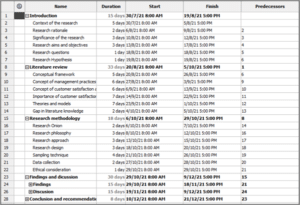
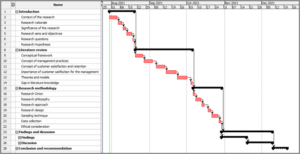
Figure 4: Gantt Chart
(Source: ProjectLibre)
The search will be divided into subparts such as introduction, literature review, research methodology, findings and discussion, and conclusion to make the research reliable and presentable. The introduction section will include the context of the research, rationale, significance, aim, and objective, research questions, and hypothesis. The introduction section will take roughly 15 days to prepare and present. The literature review section will take 33 days to be completed and include conceptual framework, the concept of management practices, concept of customer satisfaction and retention.
The research methodology chapter will take roughly 18 days to be completed and include research onion, philosophy, research approach, design, sampling techniques, and data collection methods. Findings and discussion chapters will require 30 days to be completed and include the overall findings of the research topic based on the analysed data. The conclusion and recommendations section will include the research conclusions drawn from the data analysis and finding process and it will take 8 days to be completed.
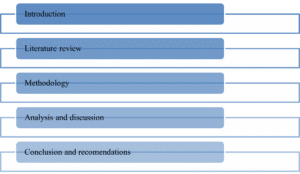
Figure 5: Flow diagram
(Source: MS Word)
References
Abbas, J., 2020. Impact of total quality management on corporate green performance through the mediating role of corporate social responsibility. Journal of Cleaner Production, 242, p.118458. available at https://e-tarjome.com/storage/panel/fileuploads/2019-11-26/1574756604_gh5.pdf
Al-Omari, Z., Alomari, K. and Aljawarneh, N., 2020. The role of empowerment in improving internal process, customer satisfaction, learning and growth. Management Science Letters, 10(4), pp.841-848. Available at http://m.growingscience.com/msl/Vol10/msl_2019_296.pdf
Brown, N., 2018. Exploring the lived experience of fibromyalgia using creative data collection methods. Cogent social sciences, 4(1), p.1447759. available at https://www.tandfonline.com/doi/pdf/10.1080/23311886.2018.1447759
Fiesler, C., Beard, N. and Keegan, B.C., 2020, May. No robots, spiders, or scrapers: Legal and ethical regulation of data collection methods in social media terms of service. In Proceedings of the international AAAI conference on web and social media (Vol. 14, pp. 187-196). Available at https://ojs.aaai.org/index.php/ICWSM/article/download/7290/7144/
Flynn, B., Pagell, M. and Fugate, B., 2018. Survey research design in supply chain management: the need for evolution in our expectations. Available at https://scholarworks.iupui.edu/bitstream/handle/1805/14917/Flynn_2017_survey.pdf?sequence=1&isAllowed=n
Kennedy, A.M., 2017. Macro-social marketing research: philosophy, methodology and methods. Journal of Macromarketing, 37(4), pp.347-355. Available at https://farapaper.com/wp-content/uploads/2019/11/Fardapaper-Macro-Social-Marketing-Research-Philosophy-Methodology-and-Methods.pdf
Lee, C.Y., 2019. Does corporate social responsibility influence customer loyalty in the Taiwan insurance sector? The role of corporate image and customer satisfaction. Journal of Promotion Management, 25(1), pp.43-64. Available at https://www.researchgate.net/profile/Chen-Ying-Lee/publication/322848762_Does_Corporate_Social_Responsibility_Influence_Customer_Loyalty_in_the_Taiwan_Insurance_Sector_The_role_of_Corporate_Image_and_Customer_Satisfaction/links/5c4d8ca1458515a4c7436af4/Does-Corporate-Social-Responsibility-Influence-Customer-Loyalty-in-the-Taiwan-Insurance-Sector-The-role-of-Corporate-Image-and-Customer-Satisfaction.pdf
Mahmoud, M.A., Hinson, R.E. and Anim, P.A., 2018. Service innovation and customer satisfaction: the role of customer value creation. European Journal of Innovation Management. Available http://ugspace.ug.edu.gh/bitstream/handle/123456789/31700/Service%20innovation%20and%20customer%20satisfaction%20the%20role%20of%20customer%20value%20creation.pdf?sequence=1&isAllowed=y
Martins, V.W.B., Rampasso, I.S., Anholon, R., Quelhas, O.L.G. and Leal Filho, W., 2019. Knowledge management in the context of sustainability: Literature review and opportunities for future research. Journal of cleaner production, 229, pp.489-500. Available at https://fardapaper.ir/mohavaha/uploads/2019/11/Fardapaper-Knowledge-management-in-the-context-of-sustainability-Literature-review-and-opportunities-for-future-research.pdf
Pallottino, F., Biocca, M., Nardi, P., Figorilli, S., Menesatti, P. and Costa, C., 2018. Science mapping approach to analyse the research evolution on precision agriculture: world, EU and Italian situation. Precision agriculture, 19(6), pp.1011-1026. Available at https://www.researchgate.net/profile/Pierfrancesco-Nardi/publication/323833472_Science_mapping_approach_to_analyze_the_research_evolution_on_precision_agriculture_world_EU_and_Italian_situation/links/5aaf8cff458515ecebe9bbbe/Science-mapping-approach-to-analyze-the-research-evolution-on-precision-agriculture-world-EU-and-Italian-situation.pdf
Pambreni, Y., Khatibi, A., Azam, S. and Tham, J.J.M.S.L., 2019. The influence of total quality management toward organization performance. Management Science Letters, 9(9), pp.1397-1406. Available at http://m.growingscience.com/msl/Vol9/msl_2019_124.pdf
Rong, S., Wang, L., Peng, Z., Liao, Y., Li, D., Yang, X., Nuessler, A.K., Liu, L., Bao, W. and Yang, W., 2020. The mechanisms and treatments for sarcopenia: could exosomes be a perspective research strategy in the future?. Journal of cachexia, sarcopenia and muscle, 11(2), pp.348-365. Available at https://onlinelibrary.wiley.com/doi/pdfdirect/10.1002/jcsm.12536
Saffar, N. and Obeidat, A., 2020. The effect of total quality management practices on employee performance: The moderating role of knowledge sharing. Management Science Letters, 10(1), pp.77-90. Available at http://m.growingscience.com/msl/Vol10/msl_2019_227.pdf
Shahid Iqbal, M., Ul Hassan, M. and Habibah, U., 2018. Impact of self-service technology (SST) service quality on customer loyalty and behavioral intention: The mediating role of customer satisfaction. Cogent Business & Management, 5(1), p.1. available at https://www.tandfonline.com/doi/pdf/10.1080/23311975.2018.1423770
Wikhamn, W., 2019. Innovation, sustainable HRM and customer satisfaction. International Journal of Hospitality Management, 76, pp.102-110. Available at https://farapaper.com/wp-content/uploads/2019/11/Fardapaper-Innovation-sustainable-HRM-and-customer-satisfaction.pdf
Know more about UniqueSubmission’s other writing services:

